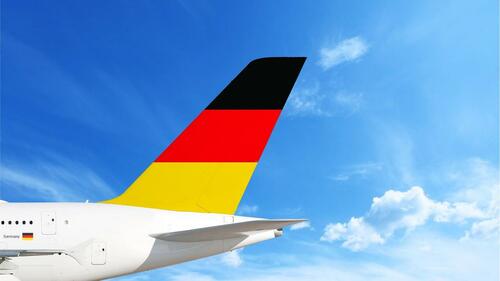German Air Traffic Remains Far Below Pre-COVID Levels
Submitted by Thomas Kolbe
Germany’s Air Traffic Falters: Ryanair Cuts Flights
Air traffic in Germany remains far below 2019 levels. Expensive regulations and the country’s economic situation are preventing a recovery. Airlines are voicing their criticism of government policies.
Passenger numbers at German airports confirm the overall crisis in the economy. With 99.4 million passengers in the first half of 2025, air traffic rose by 2.8% compared to last year but still remains 15.8% below pre-Corona levels.
The decline is particularly dramatic at the capital airport, BER. Compared with the combined passenger numbers of the former Tegel and Schönefeld airports in 2019, BER today handles roughly 30% fewer passengers.
A Gaping Capacity Gap
This is a stark indicator of the industry’s troubles, which aligns with trends in other sectors of the German economy. Both construction and key industrial sectors are operating 12 to 15% below 2019 levels. This has consequences for the labor market. In aviation, about 24% of jobs—or 60,000 of 255,000 positions—have been cut since 2019. Nationwide, job losses now total roughly 700,000.
The German economy is visibly running at low throttle. With a capacity utilization of 77.7% in Q2, well below the 83.4% average, the numbers indicate weak domestic demand as well as a cooling export sector. U.S. trade policies are likely to add further pressure. The German economy is in serious turbulence, and the country’s overall competitiveness has declined.
Criticism Grows Louder
Airlines and airport operators have long complained about Germany’s excessive costs and regulatory burden. The already strict rules of the EU Commission are compounded locally by additional taxes, levies, and bureaucratic hurdles. This combination weighs on carriers and hampers any meaningful recovery of German air traffic.
The sharpest criticism in recent days came from Irish carrier Ryanair, which announced that due to high operating costs in Germany, it would completely cease flights at Dortmund, Leipzig, and Dresden, and reduce operations in Hamburg by 60% and at BER by 20%.
Pars pro Toto
Ryanair CMO Dara Brady summed up the situation bluntly: he sharply criticized the federal government for repeatedly failing to lower or at least reduce the high air travel tax, thereby blocking the market’s necessary recovery. Brady warned of far-reaching consequences for tourism, jobs, and Germany’s connectivity to international hubs.
He announced that, if the air travel tax were abolished, Ryanair would invest $3 billion in Germany and create 1,000 new jobs. Passenger numbers could rise to 34 million annually. If high costs and access barriers remain, growth would have to shift to other European markets such as Sweden, Hungary, and Italy.
Ryanair’s message is clear: without tangible relief, more firms will pack up—impacting Germany’s economic standing and jobs in the sector. Since 2019, the number of civil aircraft stationed in Germany has dropped from 190 to 130, resulting in the loss of roughly 10,000 jobs and an annual economic output loss of over €4 billion.
Politics Remain Silent
For now, policymakers remain quiet. Only Christoph Ploß (CDU), federal tourism coordinator, responded vaguely, announcing plans to reduce the air travel tax.
Yet the 2026 federal budget contains no concrete relief measures.
The sector remains politically unsupported and out in the rain.
Germany’s Solo Flight into Isolation
Regulations hit domestic flights hardest—reflecting an ideological stance against individual mobility and aviation. Up to 35% of ticket prices now go to government charges. These include the air travel tax, which rose 25% in 2024 and accounts for roughly 10–12% of total ticket cost, plus CO₂ levies, airport usage, and flight safety fees adding another 10–15%. Airport and air traffic control fees account for 8–10%.
In a European comparison, German fees are well above those at competing locations. In Poland and Italy, for example, fiscal levies on tickets range from 10–15%. This difference is crucial in a highly competitive market. As long as the EU Commission does not implement unified regulations, location competition will persist. The looming flight of carriers to neighboring countries increases pressure on the finance minister to ease taxes. Given the tight fiscal situation, whether this is feasible remains questionable.
* * *
About the author: Thomas Kolbe, a German graduate economist, has worked for 25 years as a journalist and media producer for clients from various industries and business associations. As a publicist, he focuses on economic processes and observes geopolitical events from the perspective of the capital markets. His publications follow a philosophy that focuses on the individual and their right to self-determination.
Tyler Durden
Sun, 08/17/2025 – 08:10ZeroHedge News





 R1
R1
 T1
T1


